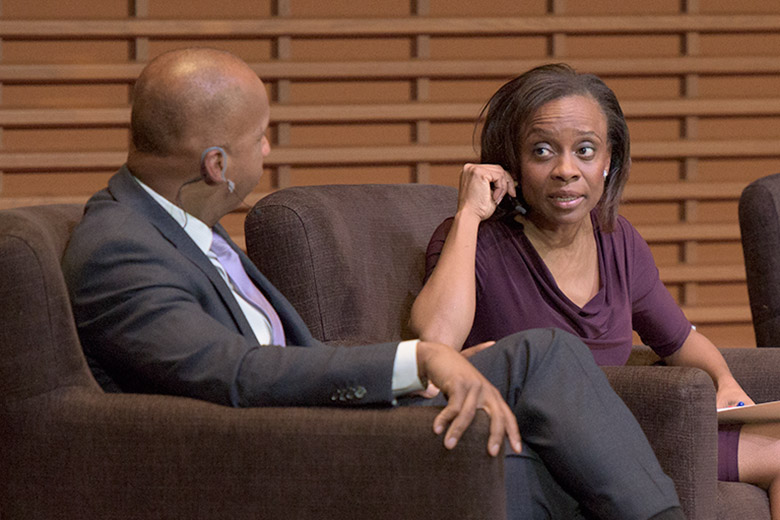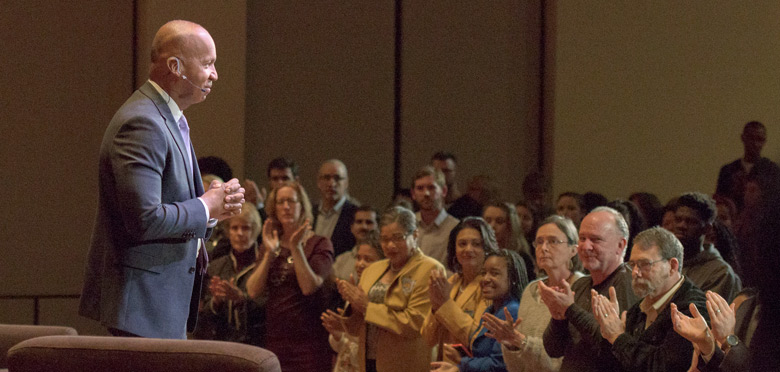Bryan Stevenson highlights racism, inequity in criminal justice system in Stanford talk
Bryan Stevenson, founder of the Alabama-based Equal Justice Initiative, said Americans need to better understand the deep racial problems in the criminal justice system and their societal consequences.
Bryan Stevenson, founder of the Alabama-based Equal Justice Initiative, brought his rallying cry for justice to Stanford on Wednesday as he discussed the motivations and challenges behind his decades-long advocacy for the poor and incarcerated.
"We are all carrying this illness, this disruption that has created a narrative of racial indifference, and because of that, we continue to suffer," Stevenson said, referring to how the legacy of slavery continues to haunt our society.
"Slavery has not ended; it's evolved."
As such, Americans need to resurrect the narrative about race because the consequent problems of bias persist not only in the criminal justice system but also in our daily lives, he said.
"On Monday, I won't get to celebrate Martin Luther King Day because in Alabama, it's Martin Luther King/Robert E. Lee Day," he said, adding how 59 markers of the Confederacy remain in downtown Montgomery, Alabama.
Stevenson, author of the New York Times bestseller Just Mercy, is a public interest lawyer whose efforts and leadership have resulted in major legal victories eliminating unfair sentencing and confronting abuse of the incarcerated. He is a law professor at New York University and a graduate of Harvard Law School.
His talk, "Just Mercy: Race and the Criminal Justice System," marked the 11th Annual Anne and Loren Kieve Distinguished Speaker Lecture at Stanford and was jointly sponsored by the Center for Comparative Studies in Race and Ethnicity and the university's new OpenXChange initiative.
In addition to the 600 audience members who filled Cemex Auditorium for the lecture, nearly 900 others tuned in to the live webcast of the event, which is still available for viewing.
'America's Mandela'
Award-winning journalist and Stanford parent Katie Couric introduced Stevenson: "Bryan's been called 'America's Mandela' – not too shabby, huh?"
At times sobering, at times humorous, Stevenson shared tidbits of his life that inspired him to continue his advocacy work – from his personal encounter with Rosa Parks and his defense of a 14-year-old being tried as an adult to his more recent legal representation of a death row inmate who was found to be innocent and was freed last year after 30 years of imprisonment.
America has the highest rate of incarceration in the world – more than 2.3 million people are behind bars in the United States – and there are "collateral consequences to mass incarceration," he said.
One in three black males born in the United States are expected to go to jail or prison, which creates an environment of despair, he said. Meanwhile, presumptions against people of color perpetuate racial bias and lead to instances of police brutality.
Stevenson recalled how a judge once told him to step away from the defense counsel table – because the lawyer hadn't arrived yet – when in fact Stevenson was the lawyer, representing a young white kid in the case.
Even within the context of the civil rights movement, trouble remains, Stevenson said.
"I hear people talking about the civil rights movement and it sounds like a three-day carnival," he said. "On day one, Rosa Parks did not give up her seat on the bus. On day two, Martin Luther King led a march in Washington. And on day three, we just changed all the laws."
Yet, he said, much work lies ahead to create more justice. "The reality is that for decades, we humiliated people regularly," he said.

Jennifer Eberhardt, a 2014 MacArthur Fellow and associate professor of psychology, was one of the faculty members who joined Stevenson in a panel discussion.
Stanford scholars who joined Stevenson in a panel discussion agreed, saying how research studies have indicated how modern discrimination issues are systemic and partly the result of policy.
Jennifer Eberhardt, a 2014 MacArthur Fellow and associate professor of psychology, said research conducted at the frontlines of law enforcement have prompted some police departments to emphasize different approaches – less heavy-handed enforcement and more community involvement.
Political scientist Gary Segura, the Morris M. Doyle Centennial Professor, cited how a recent "stop-and-frisk" study found that the number of police stops of black people in New York City outnumbered the city's entire population.
"So black people were getting stopped more than once," he said. "That's insane."
Robert Weisberg, the Edwin E. Huddleson, Jr. Professor of Law and co-director of the Stanford Criminal Justice Center, said police are not the only ones who need scrutiny. Prosecutors have the power of sentencing but are "infamously immune to being studied," Weisberg said in an explicit hint to students.
Changing the narrative
To achieve justice, Stevenson contended that Americans would have to get close to the underlying problems, change the nation's narrative, brave some discomfort and muster hope.
"We need to get closer to those places where there's poverty, abuse and neglect," Stevenson said. "There's power in proximity."
Society's narrative also must change so people do not turn toward the exits if the issue of segregation or race crops up, he said.
And without hope, progress will not ensue, he added. "Hope is what gets you to stand when other people are telling you to sit down."
Stevenson's appearance at Stanford helped to fulfill the mission of OpenXChange to provide a forum for students and community members to focus on today's societal challenges, said Vice Provost for Undergraduate Education Harry J. Elam, Jr.
"These events can educate students and get them thinking about issues they face as global citizens of the 21st century," said Elam, who heads the OpenXChange initiative.
According to attendees, Stevenson delivered.
"I've been to a number of events where others talked about the prison-industrial complex, and I found this to be the most powerful by far," John Ribeiro-Broomhead, a junior studying public policy, said after attending the lecture. "Just hearing [Stevenson's] call for proximity felt very relevant to me as a Stanford student, to engage in that analysis and that fight for justice."


Share This Story